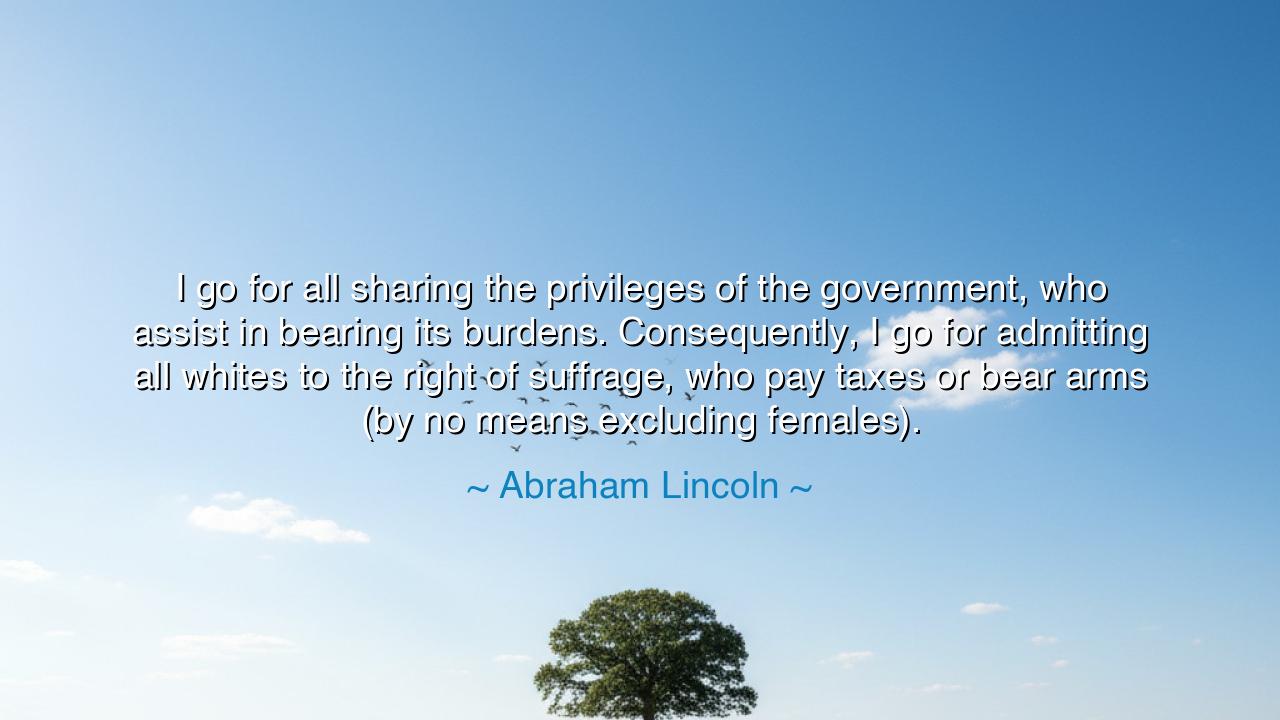
I go for all sharing the privileges of the government, who assist
I go for all sharing the privileges of the government, who assist in bearing its burdens. Consequently, I go for admitting all whites to the right of suffrage, who pay taxes or bear arms (by no means excluding females).






"I go for all sharing the privileges of the government, who assist in bearing its burdens. Consequently, I go for admitting all whites to the right of suffrage, who pay taxes or bear arms (by no means excluding females)." – Abraham Lincoln
In these words, Abraham Lincoln, long before his presidency, revealed the essence of his democratic soul. His statement, spoken in 1836 when he was still a young legislator in Illinois, resounds as a call to justice, equality, and civic duty. He recognized that government exists not merely to rule, but to serve and represent those who sustain it. To him, the privileges of citizenship must walk hand in hand with the responsibilities of participation—that those who labor, sacrifice, or contribute to the public good should also share in shaping its destiny. His was the vision of a republic founded upon fairness, where contribution and voice are intertwined.
The origin of this quote lies in Lincoln’s early years as a Whig statesman, when America was still a young democracy wrestling with who truly belonged within its promise. In the 1830s, debates over voting rights still raged—property qualifications and gender exclusion were the norm in many states. Yet here stood Lincoln, a man of humble birth and boundless moral courage, declaring that suffrage should not be the privilege of the few but the right of all who carry the burdens of the nation. His inclusion of “females” in this vision was revolutionary for its time. Though he spoke primarily within the confines of his age—referencing “all whites”—the moral logic of his words contained a seed destined to grow far beyond those boundaries.
At its heart, Lincoln’s quote is an ode to reciprocal citizenship—the belief that those who contribute to the welfare and defense of the state have earned the moral right to shape its future. He saw governance as a living partnership, not a hierarchy of masters and subjects. The farmer who tills the soil, the worker who builds, the soldier who bears arms—all are architects of the nation. For Lincoln, justice demanded that their hands, which upheld the republic, should also guide its compass. In this way, his early thinking already foreshadowed the principles that would later define his presidency: equality before the law, freedom for all who labor, and the conviction that democracy must rest on moral inclusion.
To understand the magnitude of Lincoln’s insight, one need only look to the women’s suffrage movement that arose in the decades after his death. Figures like Susan B. Anthony and Elizabeth Cady Stanton carried forward the very flame that Lincoln had kindled when he spoke of “not excluding females.” Their fight was not merely for a ballot, but for the acknowledgment that their contributions—as mothers, workers, teachers, and citizens—were part of the fabric of the nation. It took nearly a century, but the 19th Amendment eventually enshrined what Lincoln had seen long before: that the legitimacy of government depends upon the inclusion of those who sustain it.
His words also speak to a universal truth about the moral foundation of democracy. A government that reaps the labor of its people but denies them participation is a government built on hypocrisy. Lincoln understood that taxation, service, and sacrifice create a sacred bond between citizen and state—a bond of mutual obligation. To exclude anyone who fulfills those obligations is to tear the fabric of justice itself. In his time, this principle challenged the complacency of elites; in ours, it continues to challenge indifference wherever privilege seeks to silence participation.
Beyond politics, Lincoln’s statement carries a deeper spiritual resonance. He saw equality not as a gift bestowed by the powerful, but as a natural consequence of shared humanity. Every person who bears the burdens of life—who works, serves, and contributes—stands as a co-creator of the common good. This recognition transforms the act of citizenship from mere legal status into a sacred trust. It is not enough, he would say, to enjoy the fruits of freedom; one must also bear its responsibilities and defend its justice for others.
The lesson, then, is timeless: democracy thrives only when privilege and duty walk together. To share in the blessings of freedom, one must also share in its burdens. Inclusion is the strength of nations, and participation is the lifeblood of liberty. The moment we deny any group their rightful voice, we weaken the foundation upon which the whole structure rests.
And so, the practical actions are clear: engage in civic life, for freedom requires your effort. Respect the labor of all who sustain society, and defend their right to representation. Recognize that equality is not granted by law—it is affirmed by conscience and courage. In Lincoln’s vision, the government belongs not to the rulers, but to the ruled; not to the privileged, but to the contributors; not to the few, but to all who share in its burdens. This is the eternal covenant of democracy—and its enduring call to justice.






AAdministratorAdministrator
Welcome, honored guests. Please leave a comment, we will respond soon